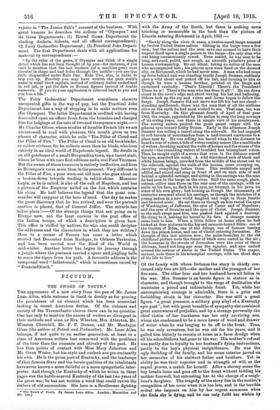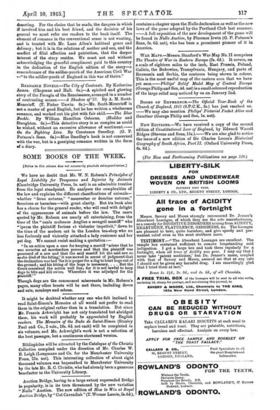FICTION.
THE SWORD OF YOUTH.* Tile appearance of a new story from the pen of Mr. James Lane Allen, while welcome in itself, is doubly so for proving the persistence of an element which has been somewhat lacking in recent American fiction. Of the richness and variety of the Transatlantic chorus there can be no question_ One has only to mention the names of writers so divergent in their methods and aims as Mrs. Wharton, Mrs. Atherton, Mr. Winston Churchill, Mr. F. P. Dunne, and Mr. Montague Glass (the author of Potash and Perlmutter). Mr. Lane Allen belongs, if not quite to an earlier generation, at least to a class of American writers less concerned with the problems of the hour than the romance and chivalry of the past. He has thus points of contact with Miss Mary Johnston and Mr. Owen Winter, but his style and outlook are pre-eminently his own. He is the prose poet of Kentucky, and the landscape of that famous State and the heroic qualities of its inhabitants have never known a more faithful or a more sympathetic, inter- preter. And though the Kentucky of which he writes in these pages was the battle-scarred Kentucky of the last two years of the great war, he has not written a word that could revive the embers of old animosities. His hero is a Southerner fighting • The Elmira of Youth. By James Lane Allom London Macmillan cad CO. De.]
with the Army of the South, but there is nothing more touching or memorable in the book than the picture of Lincoln entering Richmond in April, 1865 ,----
"Slowly along the river it came, a twelve-oared barge manned by twelve United States sailors. Sitting in the barge were a few men; but the sailors and the men save one seemed to have their respect fixed upon a single person in the barge—the only man who was being ceremoniously rowed. Even seated, he was seen to be long, awkward, pallid, and rough, an uncouth primitive piece of human workmanship. He sat silent, taking no notice of the men who accompanied him ; his piteous eyes were fixed on the doomed city, on Richmond, which he had never seen. A man who had come up from behind and was standing beside Joseph Sumner, suddenly gave a wild shout and jerked off his hat, and turning to him as though he were a human brother' pointed at the barge and exclaimed excitedly: That's Lincoln! There's the President! There hotel There's the man who has done it all !' He ran down closer to the river's edge and stood waving his hat and hallooing. Others took up the cry and voices and forms began to follow the barge. Joseph Sumner did not move nor lift his hat nor shout— standing spellbound; there was the man that of all the millions alive on the earth he had most wished inset That man, too, was from Kentucky. On this pleasant fourth of April of that year 1865, the reaper, appointed by the nation to reap the long sowings of its erring years, was there in simple view of his countrymem The rowing sailors pushed the great gaunt reaper with the piteous eyes toward Libby Prison. Early in the afternoon Joseph Sumner was rolling a barrel along the sidewalk. He had engaged Is roll barrels of merchandise from a half-burned warehouse to s, place near by. He was rolling his barrel when in the distance he heard a roar of voices, a tide of voices coming nearer like a multitude of waters ; breaking against the walls of houses and the stones of the streets—the crumbling waters of troubled but triumphant voices. Then he caught sight of a scene that even in the distance seared his eyes, scorched his mind. A wild disordered mob of black and white human beings, crowded from the middle of the street out to the sidewalk, against the walls of the houses, came sweeping on, carrying everything before them. This multitude surged and eddied and roared and sang in front of and on each side of and behind a splendid carriage, and sitting in the carriage was the man he had seen in the barge on the river. Still the same rough, plain, solemn, sallow man there on the rear seat of the carriage, with no smile on his face, no flash in his eyes, no triumph in his jaws, no sense of his own glory ; but looking as though the inhumanity of centuries swarmed about his carriage, as though the mistakes of s young nation in a new world laughed and wept in those frantic and frenzied souls. He sat there as though on him rested the eyes of Washington, of Jefferson, the eyes of Csesar and of Napoleon; and the eyes of Socrates and the eyes of Christ. Joseph Sumner, as the mob swept past him, was pushed back against a doorway. He clung to it, leaving his barrel to its fate. A strange memory came back to him. When a little fellow at home often he had looked at four pictures in the big red morocco-bound Bible: one of the Garden of Eden, one of the deluge, one of Samson tearing down the prison house, and one of Christ entering Jerusalem. He thought of this last picture now ; the palm-branches in the old childhood picture were the forest of black arms waved in the air ; the hosannas in the streets of Jerusalem were the cries of the. Africans, heard not long ago near the equator, and now united around the saviour of slaves in the United States. The reaper, saviour, rode there in his triumphal carriage, with ten short days of his life to live."
Of the family with whose fortunes the story is chiefly con- cerned only two are left--the mother and the youngest of her five sons. The other four and her husband have all fallen in the war. Mrs. Sumner is an heroic figure in stature as in character, and though brought to the verge of destitution she maintains a proud and indomitable front. Yet, while her uncomplaining courage is admirable, there is a grim and forbidding strain in her character. She was still a gent figure, "a great presence, a solitary grey sibyl of a Kentucky epic past"; but with great breadths of sympathy she combined great narrowness of prejudice, and by a strange perversity the chief victim of her harshness was her only surviving son, whom she condemned to be a mere hewer of wood and drawer of water when he was longing to be off to the front. True, he was only seventeen, but he was old for his years, and it galled him bitterly to remain at home as a farm drudge when all his schoolfellows had gone to the war. His mother's refusal was partly due to loyalty to her husband's dying instructions, partly to the boy's physical insignificance. He was the ugly duckling of the family, and his mean exterior jarred on her memories of his stalwart father and brothers. Yet in ability he was their superior and in strength of will, as the sequel proves, a match for herself. After a stormy scene the boy breaks loose and goes off to the front without bidding his mother farewell, but entrusting her to the charge of a neigh- bour's daughter. The tragedy of the story lies in the mother's recognition of her error when it is too late, and in the terrible ordeal she imposes on him by her urgent summons when she finds .she is dying,-and he can only fulfil her wishes by deserting. For the choice that he made, the dangers in which if involved him and his best friend, and the decision of his general we must refer our readers to the book itself. The element of romance in the conventional sense is not wanting, and ia treated with Mr. Lane Allen's habitual grace and delicacy ; but it is in the relations of mother and sou, and the conflict of filial affection and patriotism, that the deeper interest of the story resides. We must not end without acknowledging the graceful compliment paid to this country in the dedication of the English edition of the story—a remembrance of the soldte. r-youth of the American Civil War
to the soldier-youth of England in this war of theirs."







































 Previous page
Previous page